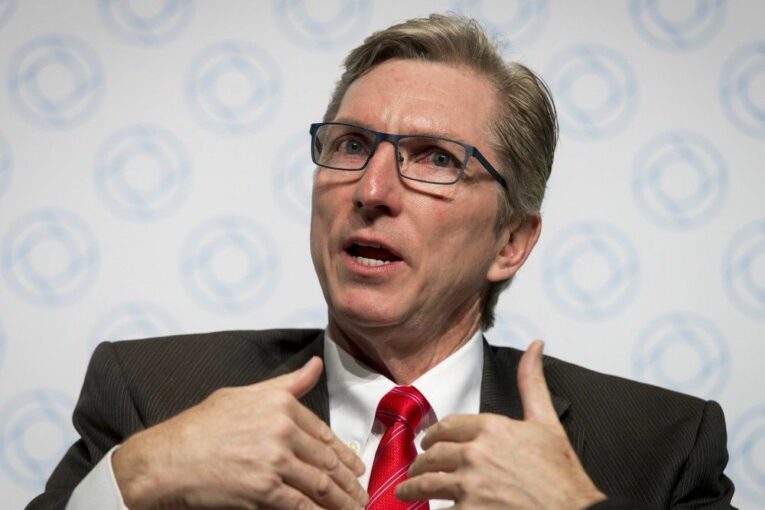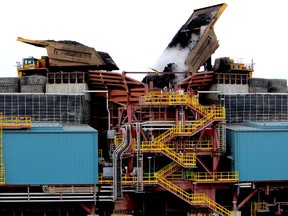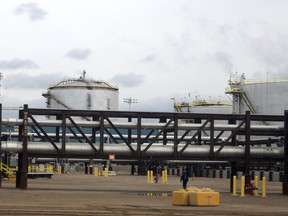
It didn’t take long for Suncor Energy to make a big splash upon CEO Rich Kruger’s return to the Canadian oilsands.
Suncor Energy announced Thursday the $5.5-billion acquisition of TotalEnergies’ Canadian operations, a blockbuster acquisition that continues the consolidation within the Alberta oilsands — and the exodus of international players from the world’s fourth-largest oil reserves.
The deal also increases the Calgary-based company’s production and provides a partial answer to the long-standing question of how Suncor can best replace bitumen output once its base mine north of Fort McMurray reaches the end of its life.
Kruger said the deal is a “major step” in securing long-term bitumen supply for Suncor’s base plant upgraders when the base mine’s life span wraps up in the mid-2030s.
“These are valuable oilsands assets that are a strategic fit for us,” he said in a news release.
The agreement includes 135,000 barrels per day (bpd) of bitumen production capacity, with Suncor snapping up the French company’s 31 per cent stake in the Fort Hills oilsands mine.

It gives the Canadian company full ownership of the project, a $17-billion development that was completed in 2018 but has struggled to reach its full potential.
Suncor also acquires half of the Surmont thermal oilsands project, which is co-owned and operated by ConocoPhillips.
The all-cash deal could include an additional $600-million payment to France’s TotalEnergies, depending upon certain production targets and the benchmark price of Western Canadian Select heavy crude being met.
The acquisition marks the first significant move by Suncor under Kruger, its new chief executive. The former head of Imperial Oil came out of retirement to take over the company just 24 days ago.
“It all adds up,” said Laura Lau, chief investment officer with Brompton Group, which is a shareholder in Suncor.
“It’s not a surprise, Rich Kruger is there to get stuff done.”
For Suncor, it marks another key step forward following a tumultuous year that saw a major activist shareholder call for a shakeup, shine a spotlight on recent fatalities at the oilsands operations and unsuccessfully press the board to sell Suncor’s Petro-Canada retail chain.
Last June, CEO Mark Little left the company, which eventually led to Kruger’s hiring.
Last year, Suncor also added to its position in Fort Hills by acquiring a 14.6 per cent stake in the mine from Teck Resources for $688 million. Meanwhile, TotalEnergies exercised its right of first refusal to buy a seven per cent interest in Fort Hills from the Canadian mining firm at the time, a stake Suncor had initially tried to acquire.
The latest deal will be debt-financed and is expected to temporarily push Suncor’s net debt past its $12-billion to $15-billion target, although the company intends to return to its planned range next year.
For TotalEnergies, the move pre-empts its previously discussed plan to spin out its Canadian oilsands assets into a separate entity through an initial public offering.
The company received several unsolicited offers for the assets, including from Suncor, which operates the Fort Hills project. The offer from its partner in the oilsands mine materialized over the past month.
“This amount is comparable to the $5-(billion) to $6-billion valuation at (an) initial listing of the spinoff company, had the spinoff project concluded,” TotalEnergies said in a news release.
For an international player looking to leave the oilsands, this made for a simple decision.
Several multinational producers have already left the region, despite the enormous size of the resource base.
Analyst Phil Skolnick of Eight Capital said the sale by TotalEnergies continues the trend of European firms leaving the oilsands amid decarbonization concerns from investors, but it offers a more prominent role for Canadian-based producers in developing the resource.
It also means Suncor won’t necessarily have to build a new oilsands development to replace production from its base mine, solving an issue for the new CEO.
“It makes total sense. The other choices they have are to do a greenfield project . . . or they bought — and buying makes way more sense than building,” Skolnick said, citing regulatory hurdles and capital cost risks.

Replacing the bitumen supply to its two upgraders at the base plant north of Fort McMurray has been an issue under close examination by Suncor officials.
Suncor does have an extension application on the base mine in place, which would produce about 225,000 barrels per day.
However, federal Environment Minister Steven Guilbeault wrote a letter to Suncor’s CEO last spring about the proposed extension plan, noting it would produce an estimated three million tonnes of emissions annually.
“I am of the opinion that the project, as currently proposed, would likely cause unacceptable environmental effects within federal jurisdiction,” he said.
Recommended from Editorial
-

TotalEnergies exits Alberta oilsands, selling stakes to Suncor for $5.5 billion
-

Suncor Energy sells North Sea offshore assets in deal valued at $1.2B
-

Varcoe: Rich Kruger is back in Canadian oilsands, this time leading Suncor Energy
With the recent deal involving Teck and the TotalEnergies transaction, Suncor has acquired 163,000 bpd of bitumen production capacity to partially replace the 260,000 bpd of base plant output.
Suncor documents indicate the purchase ensures it can keep its upgraders full from the company’s Firebag, MacKay River and Fort Hills facilities upon the end of the base mine’s life. It also has other options under consideration, including increased thermal output from its Firebag South and Lewis properties.
According to Sayer Energy Advisors, this is the biggest deal in the Canadian oilpatch since Cenovus Energy’s $15-billion acquisition of Husky Energy in 2020.
Sayer president Tom Pavic noted the acquisition was more expensive on a per-barrel basis than Suncor’s purchase of Teck Resources’ stake in Fort Hills, but in line with other recent asset sales in the oilsands.
“Basically, they have the keys to the (Fort Hills) car now, and they don’t have to worry about any partners,” Pavic said.
“They can develop this at their own pace.”
Chris Varcoe is a Calgary Herald columnist.
You can read more of the news on source
